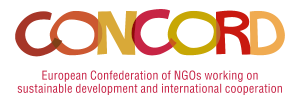EYD 2015 projects
Target country: Spain
Start date and end date of the Action: 1 May – 31 December 2015
The European Year for Development (EYD) was an excellent opportunity to bring together a vast variety of social actors working on several topics and agendas such as development, environment, gender, migration, advocacy, human rights, among others. This kind of work allowed us to share with Spanish citizens, common narratives, including comprehensive explanations about the multidimensional and interconnected causes of global inequalities, poverty and unsustainability, in coherence with the 2030 Sustainable Development Agenda. We also shared alternative proposals to contribute, in our daily life, to a sustainable and equitable world based on the respect of human rights. For us, the EYD2015 has been a chance to reinforce on the relationships already developed, building new ones with those social sectors not so involved in the Post-2015 debate, such as those more focused in the Spanish context.
During 2015, we led a social dialogue between 52 different social actors, with the aim to promote common actions within the framework of the Sustainable Development Goals (SDGs), the EYD2015 and the Spanish elections at national level. For that, we carried out around 13 bilateral meetings and 7 multilateral meetings with the different social actors, including a webinar with three European Development Platforms in Portugal, Italy and Greece in order to share the incipient process of social actors articulation, as well as a Multi-Stakeholder Seminar bringing together CSO and grassroots movements representing different development-related sectors from Spain and Europe (see below for interviews of the participants in the meeting in the video with 355 views). The seminar was an opportunity to share agendas and common working lines based on a broad understanding of global SDGs and their interlinkages with the development challenges at Spanish level. Many of the social movements that took part are citizen-based organizations. This facilitated reaching out to a broader audience, not so familiar with the international development debate on sustainability.
One of the results of this process was a Common manifesto of political proposals about development issues, which was used by most of the social actors as an advocacy tool in the national elections context. The messages refer to the model of society we want to build: human rights, respect for the planet, fair trade, decent job, the right for quality public services, fight against inequality, progressive fiscal policies, gender equality, citizen participation and coherent policies for sustainable development. This document has been signed by 19 platforms and organizations which represent more than 1,000 social actors and was published in one of the main digital newsletters in Spain – El pais.com
In this framework, we held a public meeting with political parties running for general elections 30th November 2015 which was an opportunity to include the main proposals of the common document in the political debate, questions about how they will include the new global vision of development, concerns on how important the new sustainable development goals are in their electoral programs or what institutional mechanisms will be put in place to successfully implement the new development agenda. The meeting was carried out in collaboration with eldiario.es, one of the most important digital media in Spain. 76 people attended the open dialogue and 115 people followed it by streaming at the same time, while the streaming channel received 700 connections during the meeting.
The successful communication strategy was constructed on one hand to facilitate the approximation of social actors involved in the process, and on the other hand to enable Spanish citizens to better understand the connections between local and global problems through new narratives on development. During 2015, there was a major media impact with 52 appearances in the press, radio and TV, in some of the most popular media in Spain, related to the EYD2015, the 2030 Sustainable Development Agenda, COP21, and our own social dialogue process named “Future in Common”. Each article published by the project had a reach of at least 100 people which leads to a total of 5,200 people. As a tool to facilitate the dialogue process, we have launched a website: futuroencomun.net. There are 31 networks & organizations representing more than 1,000 social actors registered on this website.
We have produced 8 videos viewed 919 times (incl. the video above) to talk about the SGDs through the explanations of concepts such as “universality”, “coherent policies”, “active citizenship for change” and how to participate in the process and our common political proposals. Videos are informal conversations “Future In Common” (159 views), “The development policy that we want” (222 views), “The 2030 Sustainable Development Agenda: challenges for everyone” (46 views), “The need of an active citizenship for change” (34 views), “The role of civil society organizations” (48 views), “How to achieve quality resources” (25 views), and “How to make coherent policies with sustainable development” (30 views). These communication materials enable Spanish citizens to better understand the connection between global politics and state commitments in relation to different policies, contributing to the creation of citizens with a global vision and a greater political engagement also in the future. All the communication materials of the project have altogether a reach of at least 193,066 people.
